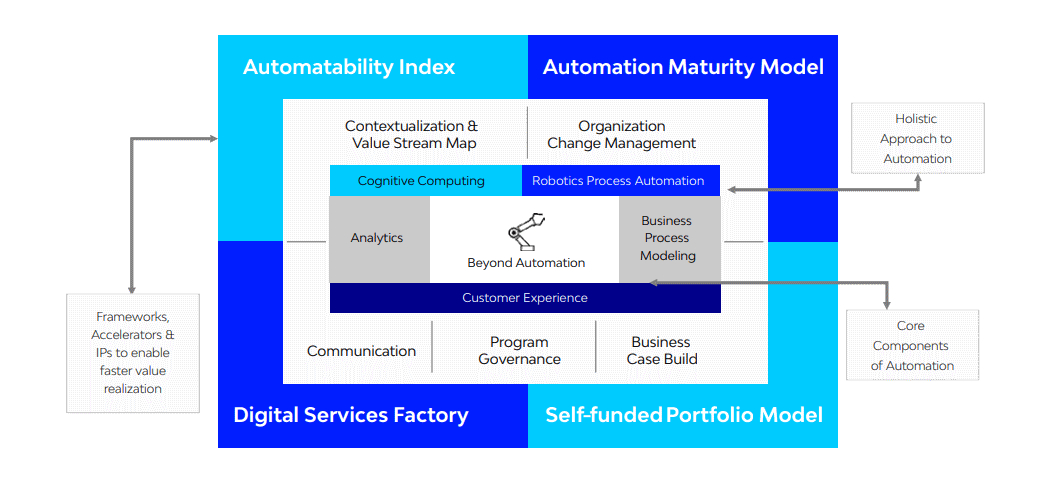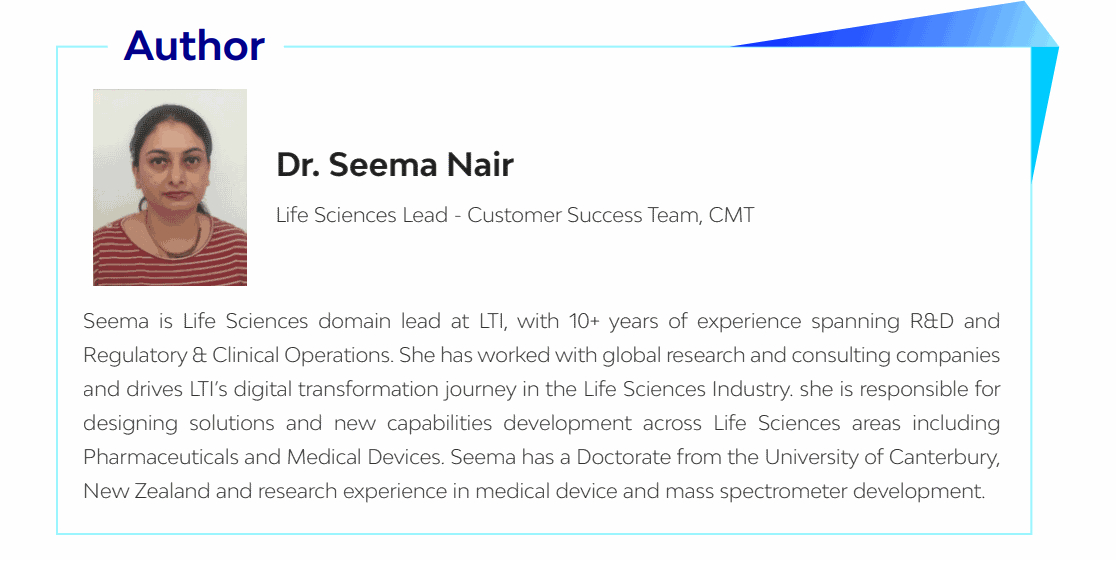Home › Industries › Life Sciences › Intelligent RPA › RPA 2.0: A transformation enabler for Life Sciences Industry
RPA 2.0: A transformation enabler for Life Sciences Industry
With digital transformation becoming indispensable in today’s world, the Life Sciences industry is leaving no stone unturned to get transfigured by adopting automation in every digital way. Robotic Process Automation (RPA) has been amongst the most adopted digital technologies over the last
couple of years, in the Life Sciences industry. RPA enables pharma companies to reduce human errors, operate at a much higher efficiency, and increase employee satisfaction by shifting their focus to more value-adding roles, further enhancing customer satisfaction and innovation.
Intelligent RPA – a force to reckon with in the coming years
RPA has evolved into much more than just a software robot that mimics human actions. The emergence of “Intelligent RPA” or “RPA ++” or “RPA 2.0” is showcasing RPA as the business transformation enabler, moving it beyond the usual perspective of a small task and process automation lever. This shift towards Intelligent RPA is also propelling the enterprise to spend across industries substantially and will make it an essential strategic initiative in the coming years.
RPA in the Life Sciences Industry
The life sciences industry is currently in a transformative phase. It is a slow adopter of new technologies as compared to other industries like Banking & Finance, CPG & Retail, etc. The reasons for this sluggish pace include realignment to the new patient-centric working model, stringent compliance, lesser direct interactions with the customers, fewer digital assets, and lesser usage. In the past few years, however, the industry has improved its momentum, and along with other cognitive elements, Intelligent RPA is increasingly gaining popularity. Few of the challenges faced by the LS industry are listed below:
- Digitization on low priority due to IT non-readiness: This is often considered as overhead by the existing IT teams, and the implementation and support of RPA require a specific skill set that may not be readily available in the current IT workforce.
- Complex interdependent processes: Automation in this industry can get complicated due to multiple touchpoints, and the sheer amount of manual intervention involved in most of the operations.
- Strict regulatory environment: By strict regulatory guidelines, changes in software and hardware are subject to compliance guidelines, which may make it difficult and cumbersome to implement automation in the industry.
Accelerated Digital Transformation with Intelligent RPA
In many automation journeys, there exists an aspiration-realization chasm, and to overcome that, particularly in a complex ecosystem of Life Sciences, is an uphill task. Cognitive technologies such as AI, ML, NLP when blended with RPA, imbibe smart capabilities to the existing RPA initiative and help magnify the outcome vis-à-vis standalone RPA. The roadmap that organizations can follow for a successful automation journey includes the following steps:

- Automation strategy: Establishing automation goals while Identifying the key constraints.
- Automation roadmap: Determine automation priorities and develop an RPA operating model, in conjunction with other digital enablers such as AI, ML, NLP, Advanced OCR and so on.
- Platform evaluation: Thorough evaluation of the platform and allied business processes.
- Automation implementation: Develop project plans and build, test and deploy RPA.
- Continuous Improvement: This should be a pragmatic approach of best practices
Beyond automation
In order to achieve the objective to automate and move a step forward, there should be a thorough understanding of the requirement and need for automation, a robust framework, accelerator components/ processes, value stream mapping, coupled with a good program governance.
Below figure displays one of the approaches of embarking beyond automation.

The road ahead
Going forward, enterprises will focus on keeping RPA as the nucleus while integrating it with other cutting-edge technologies to achieve higher business impact. RPA ++ will drive quick RoI in the areas of Clinical Development, Regulatory Submissions, Pharmacovigilance – to name a few. How organizations continue to blend different digital levers to not only maximize their RoI, but also realign their employees towards better strategic roles, will make or break the RPA case.




